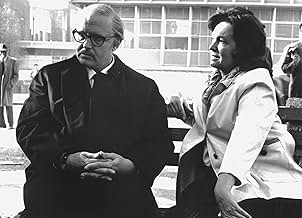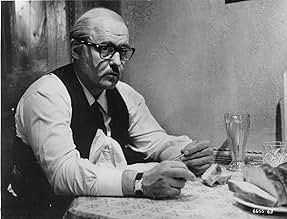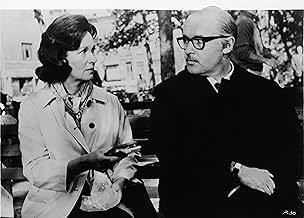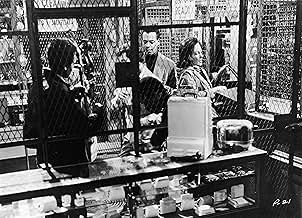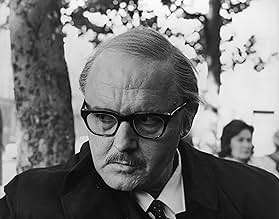A Jewish pawnbroker, victim of Nazi persecution, loses all faith in his fellow man until he realizes too late the tragedy of his actions.A Jewish pawnbroker, victim of Nazi persecution, loses all faith in his fellow man until he realizes too late the tragedy of his actions.A Jewish pawnbroker, victim of Nazi persecution, loses all faith in his fellow man until he realizes too late the tragedy of his actions.
- Nominated for 1 Oscar
- 6 wins & 10 nominations total
- Jesus Ortiz
- (as Jaime Sanchez)
- Director
- Writers
- All cast & crew
- Production, box office & more at IMDbPro
Storyline
Did you know
- TriviaRichard Sylbert's set was deliberately designed to be a series of cages--wire meshes, bars, locks, alarms, etc.--to symbolize that even though Sol was no longer in a concentration camp, he was effectively still imprisoned by his memories.
- GoofsAs Jesus runs down the street, his shirt changes from a V-neck to a turtle neck, and then back again.
- Quotes
Jesus Ortiz: Say, how come you people come to business so naturally?
Sol Nazerman: You people? Oh, let's see. Yeah. I see. I see, you... you want to learn the secret of our success, is that right? Alright I'll teach you. First of all you start off with a period of several thousand years, during which you have nothing to sustain you but a great bearded legend. Oh my friend you have no land to call your own, to grow food on or to hunt. You have nothing. You're never in one place long enough to have a geography or an army or a land myth. All you have is a little brain. A little brain and a great bearded legend to sustain you and convince you that you are special, even in poverty. But this little brain, that's the real key you see. With this little brain you go out and you buy a piece of cloth and you cut that cloth in two and you go and sell it for a penny more than you paid for it. Then you run right out and buy another piece of cloth, cut it into three pieces and sell it for three pennies profit. But, my friend, during that time you must never succumb to buying an extra piece of bread for the table or a toy for a child, no. You must immediately run out and get yourself a still larger piece cloth and so you repeat this process over and over and suddenly you discover something. You have no longer any desire, any temptation to dig into the Earth to grow food or to gaze at a limitless land and call it your own, no, no. You just go on and on and on repeating this process over the centuries over and over and suddenly you make a grand discovery. You have a mercantile heritage! You are a merchant. You are known as a usurer, a man with secret resources, a witch, a pawnbroker, a sheenie, a makie and a kike!
Jesus Ortiz: [long pause] You really some teacher, Mr. Nazerman. You really, really 's the greatest.
I think there is something to be said for artists who invent and then convince everyone afterward that what they have just experienced is the way the world is put together.
Some filmmakers do this consistently. Or they do it once, and then just live in the world they've created. Others are amazingly clever at some point, and equally banal at others. Polanski comes to mind.
When this was new, it was groundbreaking, truly an achievement. It worked.
Lumet's approach is actor-centric, not something I particularly value. But it is perfect for an exploration of a man: world growing from an individual. Lumet also likes to use space, but he doesn't know the containment properties of space, only the dividers, so we have the shop will all sorts of walls and fences. The lover's apartment as well.
What was new was this was the first movie mainstream US movie to use nudity. Its underwhelming today thank heaven, but rather shocking in its day, especially because the woman is black, and a seller of sex.
In the project, it triggers the most extended flashback sequence, one that involved our hero's deepest disaster. Overlapping flashbacks had been used, most famously in "Manchurian Candidate," which resembles this in some ways. But it hadn't been so fragmented, so apparently integrated into the fabric of the man. We see a desperate whore; he sees his humiliated wife. We see street thugs beating up a drunk; he sees the holocaust.
This cinematic device is now so common as to not be remarkable. Sex (in the form of exposed breasts) and Nazis both had more cinematic power then than now.
Is it greater art if we digest it, even if the work itself becomes ordinary in the process? Seeing this will do to you what happens with the character we see. It will undress your memory, your cinematic memory. If you saw this when you were both young, it will give you a flashback, you living both now and then.
Ted's Evaluation -- 3 of 3: Worth watching.
- How long is The Pawnbroker?Powered by Alexa
Details
- Release date
- Country of origin
- Languages
- Also known as
- Covek iz zalagaonice
- Filming locations
- 1642 Park Avenue, Manhattan, New York, USA(Nazerman's pawn shop)
- Production companies
- See more company credits at IMDbPro
Box office
- Budget
- $930,000 (estimated)
- Runtime1 hour 56 minutes
- Color
- Sound mix
- Aspect ratio
- 1.85 : 1
Contribute to this page



